Summary Report - pdf - Department of Families, Housing ...
Summary Report - pdf - Department of Families, Housing ...
Summary Report - pdf - Department of Families, Housing ...
You also want an ePaper? Increase the reach of your titles
YUMPU automatically turns print PDFs into web optimized ePapers that Google loves.
Primary carer health and wellbeingEmotional wellbeingPrimary carers’ moods, feelings and emotional reactionshave a big impact on children. In waves 2 and 3, primarycarers were asked whether, in the past 12 months, theyhad been ’sad (blue) or depressed for more than twoweeks’. In wave 3, if they answered yes to this question,they were also asked if they were getting any help for it.In wave 3,275 (19.6 per cent) primary carers answeredthat they had experienced depression for a period<strong>of</strong> more than two weeks. Of these, 61.8 per cent weregetting help, 33.1 per cent said they were not receivinghelp and 3.6 per cent said that no help was available.People indicated that they had received help from awide variety <strong>of</strong> sources. Of those who had been gettinghelp, 56.5 per cent had sought pr<strong>of</strong>essional assistancefrom doctors, psychiatrists, psychologists, counsellors orsocial workers and 22.4 per cent were on medication.Many people (22.4 per cent) relied on family and friendsfor help. Of the people who said they had experienceddepression, 18.8 per cent also answered that they hadclinical depression or anxiety when asked about healthconditions which made it difficult to look after the child.It is possible to look at the persistence <strong>of</strong> depression bycomparing wave 2 and 3 answers. Of the 1,065 peoplewho responded to this question in both waves, 9.2 per centsaid they had been depressed for more than two weeksover the previous 12 months in both waves, 25.7 per centhad been depressed in one <strong>of</strong> the two waves and 65.1per cent had not been depressed in either wave.Table 35: Emotional wellbeing <strong>of</strong> primary carers, per centEmotion Wave 1 Wave 2 Wave 3Get angry or wildreal quick?Felt everything ishard work?Felt so worried yourstomach got upset?Stopped liking thingsthat used to be fun?Do silly things withoutthinking that you feelshame about thenext day?20.8 16.1 13.219.0 19.9 15.016.4 13.2 14.215.6 10.0 9.66.3 4.1 3.5Primary carers were asked in each wave a number<strong>of</strong> other questions about their emotional wellbeing inthe previous three months. Response options included‘never’, ‘sometimes’, ‘fair bit’ and ‘lots’. These questionswere drawn from the Strong Souls questionnairedeveloped to assess the emotional wellbeing <strong>of</strong>participants in the Aboriginal Birth Cohort study(Thomas et al., 2010). They provide a general indication <strong>of</strong>the possibility <strong>of</strong> depression, anxiety and impulsivity, whichcan be an indicator for suicide risk. Table 35 compares thepercentage <strong>of</strong> people who answered ‘fair bit’ and ‘lots’to these questions across the three waves.With the exception <strong>of</strong> ‘felt so sad nothing could cheeryou up’, the proportions <strong>of</strong> people responding ‘fair bit’ or‘lots’ to the questions have decreased between waves 1and 3. Restricting the sample to the same primary carerswho participated in all three waves did not change theproportions substantially, indicating that people whohave experienced greater mental health problemswere not necessarily more likely to drop out <strong>of</strong> the study.However, without further investigation by researchersknowledgeable about mental health, it is not possible tosay whether the respondents’ mental health has in factimproved over the three year period.General healthThe vast majority (88.6 per cent) <strong>of</strong> primary carers ratedtheir general health as being ‘good’, ‘very good’ or‘excellent’. When asked if they had experienced anyhealth problems in the previous 12 months which hadmade it difficult to look after the study child, 65.6 per cent<strong>of</strong> primary carers answered no.Of the 34.4 per cent who answered that they hadexperienced such a health problem, the most commonlycited problems (apart from ‘other’ at 27.3 per cent)were pregnancy and miscarriage (19.6 per cent),flu (14.2 per cent) and clinical depression or anxiety(11.1 per cent).The percentage who said they had experienced clinicaldepression or anxiety equates to 3.8 per cent <strong>of</strong> the totalFootprints in Time sample indicating that even thoughnearly 20 per cent <strong>of</strong> people had experienced depressionin the previous 12 months (see previous section), thelength or severity <strong>of</strong> the depression had not preventedthem from taking care <strong>of</strong> the child. However, this alsoraises questions about the extent to which depressiongoes undiagnosed due to lack <strong>of</strong> awareness or accessto services. This topic deserves further investigation byresearchers experienced in health matters.Felt so worried it is hardto breathe?Felt so sad nothingcould cheer you up?5.9 6.4 4.95.8 6.2 6.3Note:The table reports the percentages <strong>of</strong> primary carers whoresponded ’fair bit’ and ‘lots’ to the questions above.48 Footprints in Time: The Longitudinal Study <strong>of</strong> Indigenous Children | Key <strong>Summary</strong> <strong>Report</strong> from Wave 3


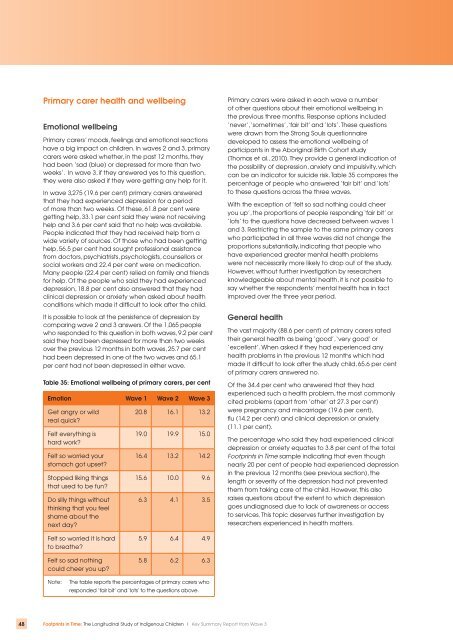

![pdf [107kB] - Department of Families, Housing, Community Services](https://img.yumpu.com/51272499/1/190x245/pdf-107kb-department-of-families-housing-community-services.jpg?quality=85)
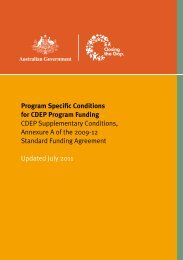

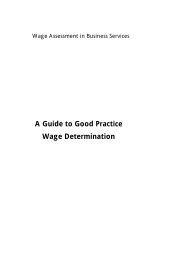
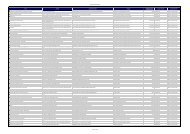
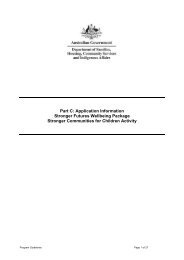
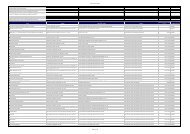
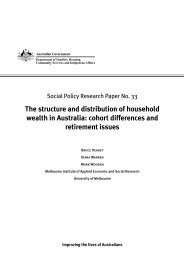



![Land Claim - pdf [278kB] - Department of Families, Housing ...](https://img.yumpu.com/47002639/1/184x260/land-claim-pdf-278kb-department-of-families-housing-.jpg?quality=85)
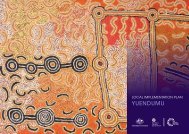
![Borroloola Land Claim - pdf [299kB] - Department of Families ...](https://img.yumpu.com/46103973/1/184x260/borroloola-land-claim-pdf-299kb-department-of-families-.jpg?quality=85)